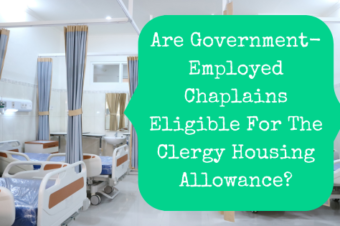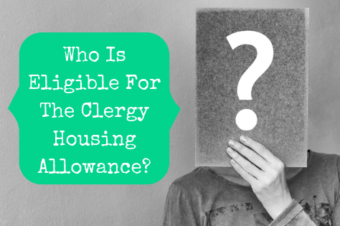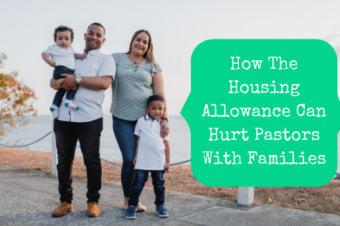
This is an excerpt from the book The Pastor’s Wallet Complete Guide to the Clergy Housing Allowance, which is available in paperback and Kindle format on Amazon.
Treasury regulations state that,
In order to qualify for the exclusion, the home or rental allowance must be provided as remuneration for services which are ordinarily the duties of a minister of the gospel.
Another term the IRS commonly uses for “services which are ordinarily the duties of a minister of the gospel” (since that’s way too long) is “ministerial services.” So, as with everything, in order to determine eligibility for the housing allowance, we need to define ministerial services. IRS Publication 517 states that “Ministerial service, in general, is the service you perform in the exercise of your ministry.” Writing this book is the exercise of my God-given ministry. Does that mean I can take a housing allowance? I wish!
Luckily, they provide further guidance, since that’s about as clear as mud. There are two different purposes for which the US government concerns itself with the definition of ministerial services. One is the housing allowance, which we are discussing, and the other relates to self-employment taxes. As such, the definitions and examples that the government provides for either one apply to the other (in almost all situations). That’s good for us because it gives us a larger body of work to pull from when looking for answers.
Ministerial service is that which you do in the exercise of your ministry. Here are the ministries that you can exercise that qualify you for the clergy housing allowance (and some that don’t):
Pastors & Church Workers
What we usually think of when we think of a pastor or minister fits well into the IRS’s common definition of someone that conducts religious worship and performs sacerdotal, or priestly, functions. Those activities are hard to define, however, because every religion is different and even denominations within a religion vary widely in their activities and worship.
Because of this, the IRS doesn’t get into specifics regarding sacerdotal functions and worship. Rather, they leave that up to each minister’s church or denomination. Treasury Regulation § 1.1402(c)-5(b)(2)(ii) allows those definitions to be governed by the tenets and practices of the particular religious body. I appreciate the freedom of religion, but boy does it make my job hard!
Sacerdotal functions usually include things like baptism, performing weddings, and administering communion. These are things that only certain people within the religion are allowed to do. Conducting worship services is similar because in most religions not everyone has the authority to run their regular gatherings.
The IRS wants to see that your religious body considers you a spiritual leader. You should have special authority and act on it. While there is some ambiguity regarding those that qualify for the housing allowance, the IRS is very clear about some people that don’t.
According to IRS Publication 517, ministers of music or education and those who serve in administrative or other functions who aren’t authorized to perform substantially all of the religious duties of an ordained minister in your church (even if commissioned as a minister of the gospel) are not eligible to take a housing allowance. As you can see, having authority is key. Overseeing the worship department is not enough. If your church doesn’t view you as a pastor, neither does the US government.
Workers In Religious Organizations
When it comes to working with religious organizations like religious boards and societies (and their integral agencies), they have a little more to say. First of all, the organization has to be under the authority of a religious body such as a church or denomination. The organization doesn’t have to be directly controlled by the church, though. They consider any organization organized for and dedicated to carrying out the tenets and principles of a faith in accordance with the faith’s rules to qualify.
However, you can’t just slap a fish on it and call any organization Christian. Your church or denomination probably has certain requirements or sanctions governing the creation of their institutions, and those must be followed for your organization to be legitimate.
Within the organization, you have to also perform legitimate work for it to qualify as ministerial services. Being the janitor for a religious society is not enough. You need to control, conduct, or maintain the organization (and not the kind of maintenance that janitors provide).
What they mean is that you need to be involved in directing, managing, or promoting the activities of the organization. Likely, it will require a leadership position within the organization. You can run a department within your denomination’s Missions Board, and though you aren’t preaching and burying people, you are performing ministerial services in the eyes of the IRS. Is this getting complicated enough for you yet? Keep reading, it gets even better!
Pastors In Secular Settings & Government
You don’t actually have to work in a church or religious organization for your activities to qualify as an exercise of your ministry. As long as you’re conducting worship and performing sacerdotal functions, those are ministerial services even if performed in secular society.
A good example of this is campus ministries. Most colleges are not religious organizations by any stretch of the imagination. Yet, many pastors work on campuses leading services and counseling students. These campus ministers are pastors through and through, and the IRS does not deny it.
The same does not ring true for government workers, though. If you are a US military chaplain, your services do not constitute ministerial services for the sake of the clergy housing allowance. You are considered to be functioning as a commissioned officer, not a minister exercising his ministry. Also, a chaplain in a state prison or government-owned hospital that is a government employee is considered to be acting as a civil servant of the state and not as a minister of the gospel. We’ve got to keep church and state separate, after all.
Church Assigned Positions
Even if you aren’t performing typical pastoral duties and you aren’t working for a religious organization, if you were directed by your church to take the position, it can count as ministerial services. The services must be assigned or designated by the church to qualify.
Be careful about trying to twist this provision in your favor if you have secular employment, though. This situation only works if your church assigned you to the position for reasons directly related to the purposes of the church. People with secular employment have gone back and had their church “assign” it, and it hasn’t ended well for them.
Work In A Religious School
Administrative duties and teaching responsibilities in a church school, college, or university qualify as ministerial services for the sake of the pastoral housing allowance. The key is that it must be a religious school. The same duties in a non-church school do not qualify. However, if a secular school provides you with faculty lodging, it may be tax-exempt because of another rule. IRS Publication 525 can give you more information about that. We only care about the pastoral housing allowance in this book.
Theological Students
If you are a theological student, just acting like a pastor is not enough to qualify you for the clergy housing allowance. When serving a required internship as a part-time or assistant pastor you can’t exclude a parsonage or rental allowance from your income unless you are ordained, commissioned, or licensed as a minister.
Traveling Evangelists
Traveling evangelists who are ordained ministers are eligible to take a housing allowance from the money given to them by churches located away from their home community. This comes from Revenue Ruling 64-326, which allows for the housing allowance of an ordained minister to be paid by multiple churches. All of the same rules apply, so it must be designated in advance in writing and used to maintain a permanent home.
Missionaries
For missionaries who are ordained, licensed, or commissioned ministers, all of the same rules apply. Whether or not a missionary should claim a housing allowance, though, will depend on their personal tax situation. There are a lot of complex rules surrounding Americans abroad and they are beyond the scope of this book.
If you’re a missionary, just know that you’re still subject to US taxes no matter where you live and you really should work with a tax preparer or financial planner that understands expat taxation. If you try to do it yourself, you’ll either die of boredom or make costly mistakes. The costly mistakes can even happen if you work with a professional if they’re not experienced in working with Americans abroad. Please, please, please, believe me on this one. And thank you so much for what you’re doing. The rest of us really admire and appreciate it.
If you want to learn more about the clergy housing allowance, pick up a copy of The Pastor’s Wallet Complete Guide to the Clergy Housing Allowance on Amazon today!




12 Responses
Rhonda
July 1, 2020Working in a religious qualifies as minister duties. Does the religious school have to be UNDER the authority of a church? Or can it be any faith-based school that has called workers from a church denomination?
The school is separate from the local church and has no church oversight.
Amy
July 1, 2020Rhonda, that is a difficult question. The law states that the housing allowance must be designated by a church or church denomination. You can read more about what it says here: https://pastorswallet.com/who-is-allowed-to-designate-a-ministers-housing-allowance/ Because the school is not under the authority or a church or church denomination, my interpretation of the law would be that it would not be eligible. However, you could request a private letter ruling from the IRS to be sure.
Rhonda
July 3, 2020Yes, I agree it is a complicated situation. According to the bylaws of the called/commissioned ministers: The exercise of the ministry includes teaching or holding administrative positions in churches, parochial schools, colleges or universities, and other religious organizations under the authority of a church.
This school broke away from local church and has their own set of bylaws, school board etc. There is no church oversight over the school. The wording that caught my eye is “other religious organizations under the authority of a church:
Another part of the call vs contracts says the following:
The Internal Revenue Code allows a “minister of the Gospel,” under certain circumstances, to
exclude from taxable income the value of a parsonage or a housing allowance. To qualify for the exclusion, the home or housing allowance must be provided to a minister and must be part of compensation paid for services as a minister of the Gospel. Being ordained or commissioned or being on a roster is not enough.
If a minister is not conducting activities in the “exercise of his/her ministry,” he/she cannot
take advantage of the parsonage or housing allowance exclusion. Both the minister and the employer may be penalized if this requirement is ignored.
Chasz
February 26, 2024Can a hospital chaplain at a for-profit hospital qualify for the ministerial housing allowance? If so, what would be the steps?
Amy
February 26, 2024Chasz, I’m not exactly sure how it would work for for-profit chaplains as I have not seen that addressed by the IRS. I would recommend calling them and asking to speak to a technical expert to find out.
Rick
March 11, 2024Amy – I have roughly the same question, son in law is being ordained by our denomination but is working for a local non-profit hospital. And I found Rev. Rul. 71-258, 1971-1 C.B. 283 – which seems to state a housing allowance can be utilized in that situation.
Amy
March 15, 2024Rick, yes, the IRS publications say that a minister working at a non-profit hospital can claim a housing allowance. As for the exact logistics, he would have to discuss it with his HR department.
Chaplain Jerry McNamara
March 27, 2024Amy, please help my confusion! Your post states “Also, a chaplain in a state prison or government-owned hospital that is a government employee is considered to be acting as a civil servant of the state and not as a minister of the gospel.” This seems to directly contradict the statement in your book on page 25, where you wrote that chaplains at government-owned hospitals was the one exception to chaplains in government -owned positions (military or state jails, etc.). Please clarify which position is correct. THANKS!
Amy
March 27, 2024Jerry, I received your email about this as well and am doing some further research because the IRS documents also appear to be contradictory. I will get back to you as soon as possible.
Chaplain Jerry McNamara
March 27, 2024Thank you for helping those of us who minister to the poorest and under-insured in county-run hospitals and healthcare systems!
Chaplain Jerry McNamara
April 3, 2024Any update, Amy?
Dale
April 22, 2024Should a local church filing a 1099-NEC for compensation paid to an evangelist include the amount previously designated as a housing allowance in Box 1? I haven’t found the answer in any of the IRS guides I have consulted. Thanks!